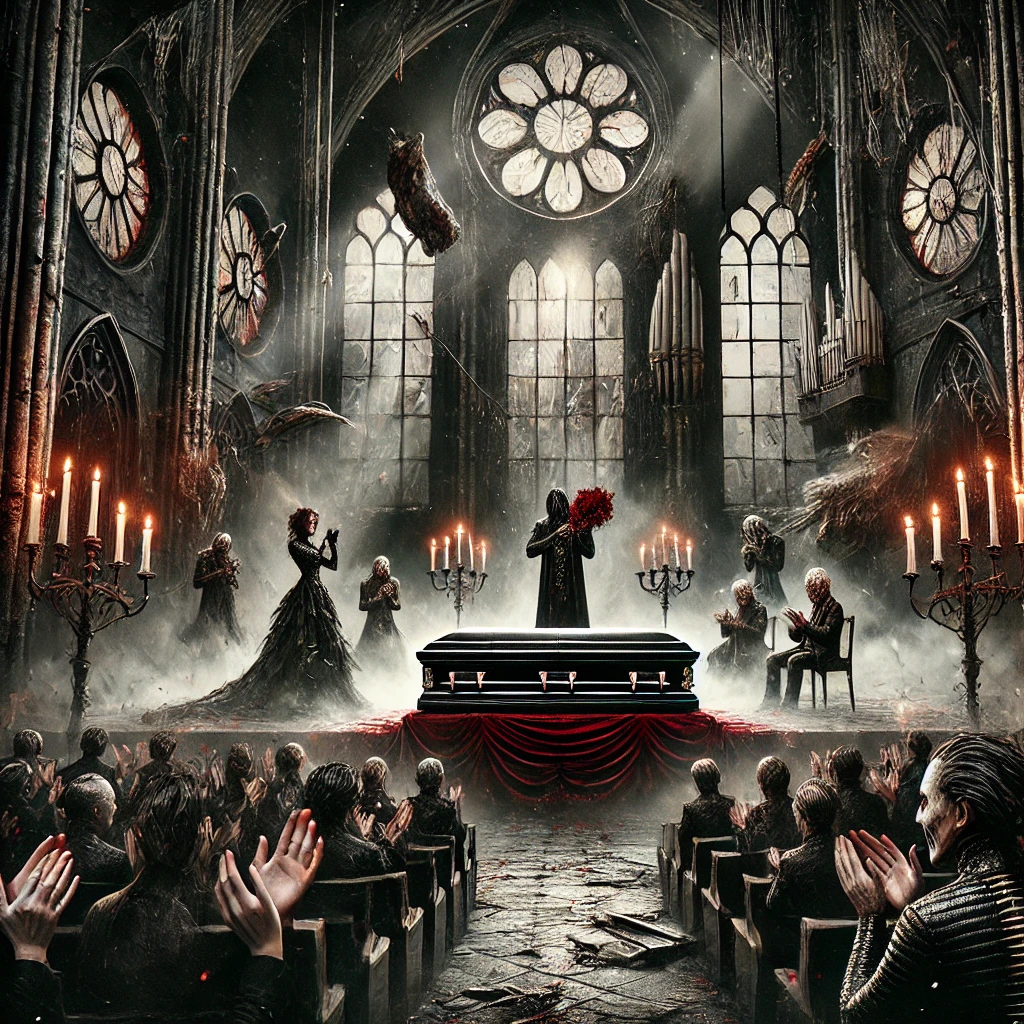Marilyn Manson’s “No Funeral Without Applause” from “One Assassination Under God – Chapter 1” carries all the hallmarks of his theatrical and darkly poetic lyricism. The song embodies a reflection on mortality, identity, and the desire for significance even in decay.
Theme and Meaning
- The Dotted Line and Mortality (Verse 1):
- The opening imagery “It just started with a dotted line” invokes the signing of a contract, perhaps a Faustian bargain or a life-altering commitment that sets the stage for everything to follow. The dotted line could symbolize compromise—whether with the self, society, or something more sinister.
- “Skin whiter than a surgical glove” paints an image of sterility and lifelessness, like a cadaver or someone drained of vitality. The mention of needing to be “stitched up” hints at fragility, both physical and emotional—Manson often deals with themes of brokenness seeking repair. Here, the speaker wants to avoid bleeding onto “the one I love”, suggesting a desire to shield others from their pain, guilt, or chaos.
- The “Funeral Without Applause” (Pre-Chorus):
- This line, repeated like a mantra, drips with irony and emotional weight. A funeral with applause feels contradictory—death met with ovation, as though the end of someone’s life deserves celebration, performance, or spectacle.
- Manson critiques a world that prioritizes appearances, where personal struggles are overlooked unless accompanied by a dramatic flourish. The funeral becomes a stage: perhaps a metaphor for craving validation even at life’s darkest moments.
- The Need for Pain to Feel Alive (Chorus):
- The chorus amplifies this craving for sensation. “Just a little cut to make it all feel better” plays with the concept of self-inflicted pain as a coping mechanism—an attempt to reconnect with existence when numbness sets in. It’s hauntingly confessional.
- The scars “from what it used to be” suggest emotional baggage or trauma left behind, but not forgotten. Despite this, there’s one saving grace: “You’re the only thing in this fucking world / That can fill this hole inside of me.” This line reveals dependency—on a person, an idea, or perhaps even an addiction—as a remedy for emptiness.
- Immortality and the Eternal Struggle (Verse 2):
- The line “You can send away your firing squad / You’re gonna need to behead me” evokes rebellion and defiance. The firing squad, a symbol of societal judgment or punishment, fails to eliminate the speaker’s presence. The imagery of beheading aligns with the theme of annihilation as a requirement for freedom—suggesting that only total destruction can stop this relentless search for meaning.
- “Immoral looking to be immortal” is a quintessential Manson line, touching on his fascination with decadence and permanence. The speaker searches for an identity that transcends morality and mortality but finds that nothing “fits to a T”—a sense of alienation and existential frustration.
- The Bridge: The Need to Escape Time and Truth
- The bridge (“Cover up all of the mirrors / Cauterize all of the lies”) reflects the desire to escape self-reflection and the truth. Mirrors symbolize identity, and covering them suggests denial—perhaps of the decay of the self or the lies one lives.
- “Stop the hands on the clock forever” expresses a wish to freeze time, to hold onto fleeting moments or avoid inevitable change. The final line, “Forget what we left behind”, seeks to erase the past—regrets, mistakes, and scars.
Core Symbolism
- The Funeral: A representation of finality, but also theatricality. In a performative society, even suffering becomes a spectacle. The lack of applause would signify obscurity or insignificance—something the speaker cannot bear.
- Scars and Cuts: Symbols of pain, trauma, and the need to feel. They hint at a masochistic relationship with existence, where pain is preferable to numbness.
- Mirrors and Time: Identity and mortality are the primary enemies. Covering mirrors and stopping clocks symbolize rejecting the inevitability of death and decay.
Emotional Tone
The song exudes despair, defiance, and a yearning for significance. Manson juxtaposes vulnerability (“I need somebody to stitch me up”) with grandiosity (“There’ll be no funeral without applause”), showcasing a speaker who feels broken yet refuses to disappear quietly.
The repetition of the pre-chorus and outro amplifies a sense of obsession with being remembered or validated, even in death. This echoes the idea of an artist performing for an audience, desperate to make their mark before the curtain falls.
Final Thoughts
In “No Funeral Without Applause”, Marilyn Manson delivers a raw meditation on mortality, identity, and the human craving for recognition. It’s a twisted love letter to existence itself—where pain, love, and performance all intertwine in a desperate attempt to escape insignificance. The imagery is bleak yet beautiful, filled with existential defiance.
Manson continues to hold up a mirror to society’s contradictions: we glorify suffering, applaud decay, and fear invisibility above all else. For the speaker, oblivion without recognition is worse than death itself.
